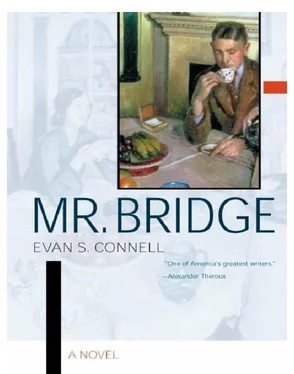“Don’t say I didn’t warn you. This fellow likes to put on a show. I have no idea what we’re getting into.”
Mrs. Bridge smiled and insisted she was looking forward to it.
Nobody greeted them at the door, but the door was wide open and since it was ridiculous to stand there ringing the bell they walked in. They could not get in very far because of the crowd. The air was warm and smoky and at first they thought something was on fire. Leading his wife by the hand, Mr. Bridge pushed ahead and found their host playing the drums while the drummer had a drink. Somewhat later they had a chance to talk to him. And, after a while, they belonged to the party and found many people they knew. The Arlens were there and the Montgomerys were there. Avrum Rheingold was there eating and drinking everything in sight. He mentioned a nice little company, the Poseidon Corporation based in Tampa, Florida, selling sea horses by the thousands. This little company was growing like a beanstalk. Avrum Rheingold hinted it could be worthwhile to meet for lunch one day.
The Hodges were there with a lady from New Zealand who did not stop talking. Dr. Foster was there, a drink in his hand, chuckling genially at whatever was said. The Koeppels and the Lutweilers were there. Mabel Ong in her familiar tweed suit, with a volume of poetry under her arm as usual. The Ralph Porters just back from another European vacation; they had not cared very much for Denmark. Grace and Virgil Barron were there. Edith and Leo Snapper appeared; however, they were difficult to talk to. Her imperial manner and her royal coiffure disconcerted Mrs. Bridge, and there was something furtive about Leo Snapper which Mr. Bridge disliked. The Beckerle sisters arrived in ancient beaded velvet gowns which looked as though they had been packed in a trunk for half a century, and Judge Chisholm stopped by for a little while.
But by far the majority of the guests at the open house were strangers.
“Well! That was a three-ring circus if ever I saw one,” she remarked while they were driving home. “My word, it was a struggle to turn around.”
“Great God, that music,” he said, shaking his head in disbelief. “It sounded like a traffic jam. Horns blowing all over the place. I don’t see how a person can enjoy that.”
“I agree one hundred per cent, but I suppose some people must like it. Otherwise they wouldn’t listen. However, it certainly was bedlam. I did like some of his ‘objets d’art’ though, didn’t you?”
“Nothing I’d care to put in our living room.”
“Oh, well, neither would I. But I thought some of it was intriguing. Grace and I visited the Nelson Gallery last week, and several of Dr. Sauer’s things reminded me of paintings and sculpture we saw in the gallery.”
“You can have the whole bunch, and welcome to them. He must have invested a small fortune in that stuff. I wouldn’t profess to know why. It’s beyond me.”
“I’m not defending everything he has, but I do think it would be good for you to take an interest in art.”
“If half that junk Alex has collected is ‘art’ I’m a Fiji Islander. Any time you want to go look at it you’re free to call up Alex or his little friend. They’d probably be delighted to give you the grand tour. So help yourself. But if you want my opinion, the children did better when they were five years old. Any one of them could paint a better picture right now than most of the stuff Alex has hanging on the wall. I don’t pretend to be a connoisseur of art. I never have. I don’t care for it very much, and Lord knows I haven’t the time, but I’m not afraid to say what I think. And I think most of that stuff is junk, junk pure and simple. So there you are.”
“My word, you sound so provoked!”
“Furthermore, I don’t believe he likes the stuff either. In my opinion it’s all a pretense, right along with his checkered vests and Italian suits and the rest of that nonsense. That’s why I sound ‘provoked,’ as you call it. Lord, if he had a Rembrandt or one of those Dutch sitting rooms where the people are recognizable human beings I could see the point of paying good money. But this African primitive business and these surrealist or cubist schools, or whatever they’re called nowadays — it’s too much for me, I tell you. And I’m willing to bet you a dollar to a doughnut that fifty years from today you won’t find hide nor hair of it.”
“I feel the same way,” Mrs. Bridge said. “My only point was that I did find it interesting for a change.”
“Suit yourself. Any time you want to look at it, call up Alex. You and Grace Barron hop right over there and admire it to your heart’s content. One more thing — those Negroes. There’s another example for you: he invited those people for one reason, and one reason only.”
“You know perfectly well they’re friends of his.”
“I know they are. But I also know he invited them because they’re black.”
“Now, Walter, that simply is not fair. You can’t possibly know he invited them for that reason.”
“As you like. As you like,” he replied in an uncompromising voice.
“They didn’t bite anybody.”
“I have not criticized those people in any way. I am talking about Alex. And the next thing you know, he’ll be inviting them to lunch at the Muehlebach.”
“I doubt if he’d go that far.”
“You don’t know the man. I do.”
“I scarcely know him at all. Perhaps you’re right. In any case, I am awfully glad we went to the affair. And if you’d acted a bit more sociable you might have had a good time yourself.”
“I did have a good time,” Mr. Bridge said. “I don’t need to trot around shaking hands with every Tom, Dick and Harry in order to prove it.”
“I know, but you see so much of Stuart and Virgil and the other men that I should think this would have been an opportunity to meet somebody new.”
He replied that he knew more than enough people already.
That summer Ruth applied for a job with a local company called Blissco, which produced an assortment of household and office novelties. The founder and president of this company was a young man named Harry Bliss, who hired Ruth as soon as he saw her. When he discovered that she could not take shorthand and could barely operate a typewriter he put her to work painting phosphorescent floral designs on wastebaskets, an item he invented at that moment.
Her parents were pleased that she had found a job, because they had expected her to spend the summer as usual, tanning herself beside the pool at the country club and loitering with Dodie in a booth at the Walgreen drugstore. They agreed the job would be good for her. She did not like to work, she had never done much work of any sort. She slept late and always seemed to be lying around the house.
From what she told him about the company Mr. Bridge surmised that Blissco might not last very long, but if it was able to pay her salary every week he could see no harm in allowing her to paint wastebaskets. If Carolyn had taken such a job he would have been impatient, but Ruth did not have Carolyn’s brains. Of course it was absurd that anybody should spend a summer decorating wastebaskets; however, it would keep her occupied, and as he thought of the way men must look at her he concluded that it might be prudent to keep her in an office where she was more or less out of sight. She was now seventeen, and he did not like to consider what might happen. She lacked not only the intelligence but the armor of Carolyn, who, at fifteen, already had learned to defend herself like a porcupine.
Ruth spoke constantly and rather foolishly about her job — what a marvelous company it was, how lucky she was that Mr. Bliss had given her a job in spite of her inexperience, how brilliant he was, and of the opportunity it offered to begin a career as a commercial artist. But one afternoon when the temperature downtown rose to ninety-eight degrees and Julia had an attack of nerves and dizziness Mr. Bridge decided to quit work earlier than usual; when he got home he discovered Ruth lying on the porch swing, wearing shorts and a halter. She was reading a movie magazine. He could not understand why she was there instead of at work, so he asked what she thought she was doing. She squinted up at him as though this question did not make sense. He asked why she was not on the job. She scratched her breast and answered that she had quit several days ago.
Читать дальше












